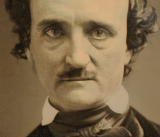Stuart Merrill
An American Symbolist from Hempstead, Long Island
https://en.wikipedia.org/wiki/Francis_Viel%C3%A9-Griffin
An American Symbolist from Hempstead, Long Island
https://en.wikipedia.org/wiki/Francis_Viel%C3%A9-Griffin

Americans were in the middle of it from the very beginning.
Here, for now, are various directions that could be developed.
Distinguish between "symbolism", which dates to the origin of language, and "Symbolisme" an intuitive form of proto-structuralism that leads to more scientific attemps at structuralism in Freud, Jung, Saussure, Levi-Strauss.
Symbolisme = intuitive, performative structuralism?
Joseph Campbell was Symbolisme's last hurrah, perhaps?
Since then it has been sprayed with post-structuralist or positivist bug spray?. It also crept into pop-psych and self help, but also into David Lynch's Twin Peaks.
This is Major Briggs’ letter to his son, from Twin Peaks:
"A vision I had in my sleep last night - as distinguished from a dream which is mere sorting and cataloguing of the day's events by the subconscious. This was a vision, fresh and clear as a mountain stream - the mind revealing itself to itself. In my vision, I was on the veranda of a vast estate, a palazzo of some fantastic proportion. There seemed to emanate from it a light from within - this gleaming radiant marble. I had known this place. I had in fact been born and raised there. This was my first return, a reunion with the deepest wellsprings of my being. Wandering about, I was happy that the house had been immaculately maintained. There had been added a number of additional rooms, but in a way it blended so seamlessly with the original construction, one would never detect any difference. Returning to the house's grand foyer, there came a knock at the door. My son was standing there. He was happy and care-free, clearly living a life of deep harmony and joy. We embraced - a warm and loving embrace, nothing withheld. We were in this moment one. My vision ended. I awoke with a tremendous of optimism and confidence in you and your future. That was my vision; it was of you. I'm so glad to have had this opportunity to share it with you. I wish you nothing but the very best, always."
Up to Campbell, it dominated, Goethe, Grimm, Wagner, Teick, Poe, Baudelaire, Mallarme, Valery, Debussy, Hemmingway....
What dominates now?
From Poe through Joyce we were happy learning what our sinews, our nervous systems, our bodies hold (structures, archetypes); now we fight that, we resist. We were happy about archetypes because we thought we found something we shared.
We now fight over the archetypes; a post-structuralist moment of pessimism regarding our ability to share anything.
We are In an age of Icarus. We've moved from Marsyas to Icarus.
Steinbeck (all his animal metaphors for human behavior), Djuna Barnes (the bestiality in Nightwood) are transitional into the Icarus phase, the moment of discontent with the realities of our bodies, openig the door to some varieties of body-dysphoria? Interesting that these two are Americans. Is body dysphoria more pronounced in the US?
Exploring here the connection between post-structuralism and body dysphoria.
///////////////////////////
Baudelaire & Mallarme were at the center of the Symbolist movement. They both considered Poe a spiritual father. Moreover, there are two American Symbolistes who played important roles: Francis Vielé-Griffin and Francais Stuart Merrill. Our other apps curate existing music. In this one, the app will, hopefully provide a framework for a group of new works.
What is Symbolisme?
It is best to assume that all who come here know nothing about Symbolism and are, moreover, entirely suspicious, assuming that Symbolism is a construct, an error that needs to be corrected, something as outmoded as religion or pantheism, something surpassed by a wiser and more essential and more modern approach to the problems of existence. This will be an ambitious *reconstruction* aimed at a Christopher Hitchens or a Richard Dawkins, or at a positivist.
One aim of positivism was to reduce all metaphysics to formal tautologies.
We might say that the first Dawkins or the first Hitchens, or the first Kahneman/Tversky was Auguste Comte.
When Baudilaire rebelled against anything "positif", he had to have Comte in mind, no?
We all know positivists who spend time in art museums. What are they doing there? The artists, the poets, the composers know something, something inspires curiosity in the otherwise reason-besotted positivists.. The positivists feel it in their bones, but they can't wrap their heads around it. There is a place for the head.
[ on a pike?-- no, no ]
© 2016-2025 Marsyas Productions | ProcessWire | Nibiri | Design: HTML5 UP,